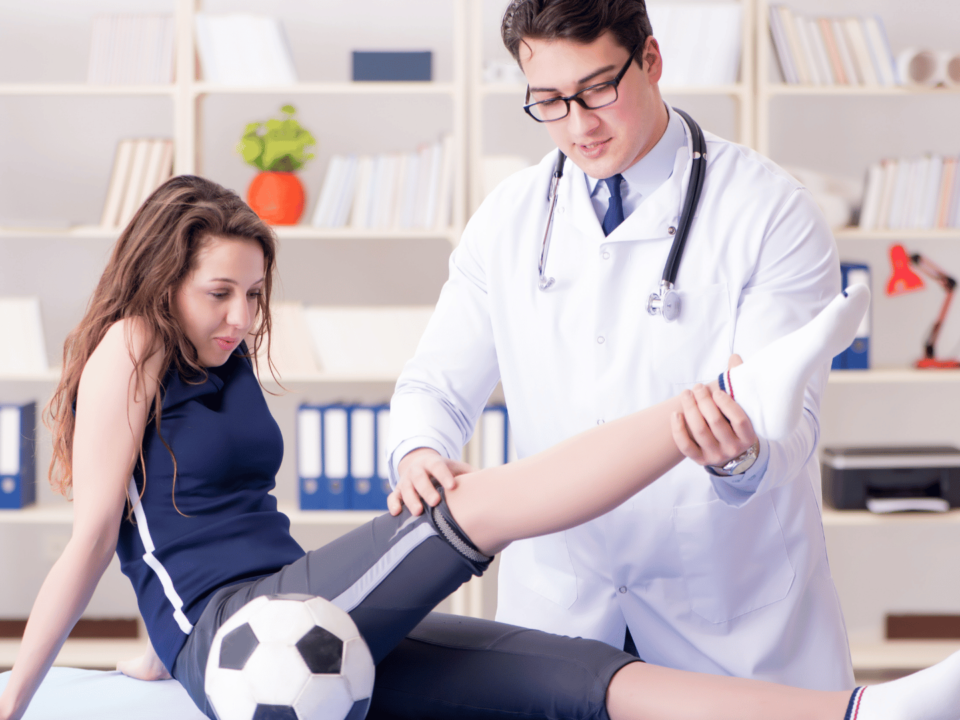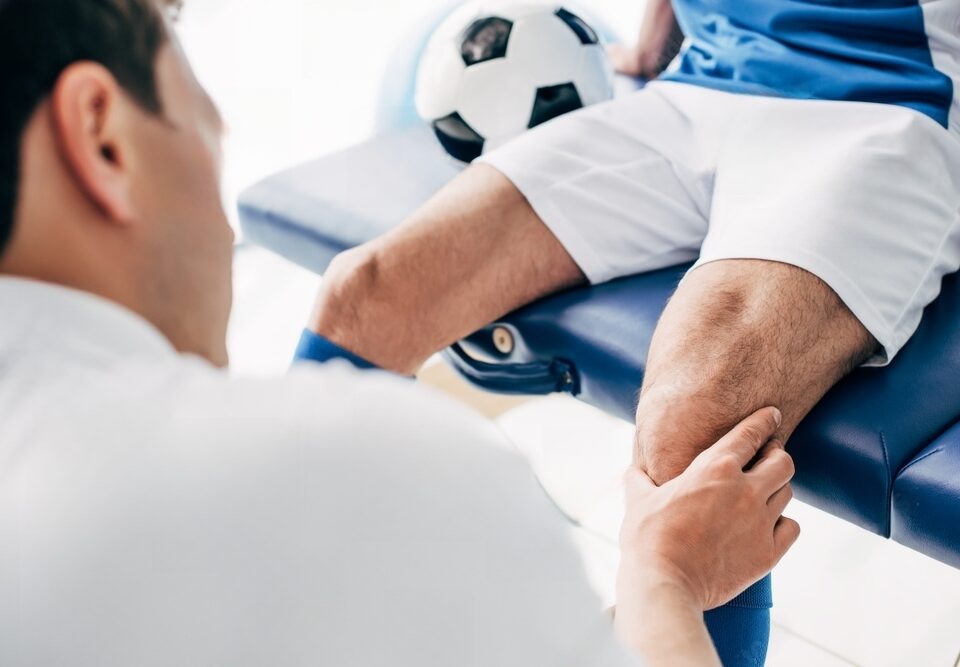
How to Find the Best Arthritis Specialist Near Me?
May 17, 2023
Finding the Right Hormone Replacement Therapy Near Me
June 9, 2023When participating in sports, injuries are a common occurrence. From minor bruises to serious muscle tears, every athlete will experience some form of injury at one point or another. This is where a sports injury specialist comes in. Finding the right specialist for your specific needs can mean the difference between a successful recovery and a prolonged healing process. Here’s what you should know when searching for your sports injury specialist.
Understanding Sports Injuries
Sports injuries occur due to the repetitive strain of muscles, ligaments, and tendons. The intensity and duration of the sports activity can increase the likelihood of injuries. Sports injuries are not limited to professional athletes; amateur athletes and individuals who indulge in sports for recreation are also susceptible. If you experience any discomfort or pain in the muscles or joints, it’s crucial to seek assistance from a sports injury specialist immediately.
It’s essential to understand the cause of the injury to prevent future occurrences. Lack of proper warm-up exercises, poor technique, and inadequate protective gear can all contribute to sports injuries. It’s crucial to ensure that you have the correct equipment and follow the correct procedures to prevent injuries.
Common Types of Sports Injuries
There are several types of sports injuries that athletes can experience, such as:
- Strains and sprains
- Shin splints
- Tendonitis
- Dislocations
- Fractures
Each injury requires specialized attention and treatment. A skilled sports injury specialist can help to alleviate the pain and complications associated with the injury and ensure a smooth recovery process. Schedule an appointment today with Dr. Corey Welchlin to start your healing journey.
Strains and sprains are the most common sports injuries. They occur when a muscle or ligament is stretched beyond its capacity, leading to damage. Shin splints are another common injury that affects runners and athletes who engage in high-impact activities. It causes pain in the lower leg, and if left untreated, it can lead to stress fractures.
Tendonitis is an injury that affects the tendons, which are the tissues that connect muscles to bones. It causes pain and inflammation in the affected area. Dislocations occur when a bone is forced out of its socket, causing severe pain and immobility. Fractures are breaks in bones, and they can be caused by sudden impact or overuse.
The Importance of Proper Treatment
Proper treatment is a crucial component in the recovery process when dealing with sports injuries. Failure to receive the proper care can lead to the injury developing more severe conditions, chronic pain, and long-term damage. Seeking help from an experienced and specialized sports injury specialist will ensure that you receive the correct treatment to recover quickly and effectively.
The treatment for sports injuries varies depending on the type and severity of the injury. Rest, ice, compression, and elevation (RICE) is a common treatment for minor injuries. Physical therapy and rehabilitation exercises can help to strengthen the affected area and prevent future occurrences. In severe cases, surgery may be necessary to repair the damage.
It’s crucial to follow the recommended treatment plan and give your body time to heal. Returning to sports too soon can lead to re-injury and delay the recovery process. It’s essential to listen to your body and seek medical attention if you experience any pain or discomfort during the recovery process.
In conclusion, sports injuries are a common occurrence, and they can affect anyone who engages in sports activities. It’s crucial to understand the causes and types of injuries to prevent future occurrences. Seeking help from a specialized sports injury specialist is essential in ensuring a smooth recovery process and preventing long-term damage.
The Role of a Sports Injury Specialist
Participating in sports and other physical activities can be an excellent way to stay healthy and fit. However, injuries are an inevitable part of the process, and they can happen to anyone, regardless of skill level or experience. This is where a sports injury specialist comes in.
A sports injury specialist is a healthcare professional who specializes in treating and preventing sports-related injuries. They understand the unique demands that sports and physical activity place on the body and are trained to diagnose and treat a wide range of injuries.
Center for Specialty Care has experienced providers that will help you get back on your feet.
Assessing Your Injury
One of the primary responsibilities of a sports injury specialist is to examine and assess the nature and severity of the injury. This process involves a thorough examination of the affected area, as well as a discussion of the symptoms and circumstances surrounding the injury.
During this assessment, your sports injury specialist will use their knowledge of the science behind active individuals and sports injuries to diagnose the issue accurately. This diagnosis is crucial because it allows your specialist to prescribe the correct treatment, which can help speed up the recovery process and prevent further injury.
Developing a Treatment Plan
Once your sports injury specialist has determined the nature and severity of your injury, they will develop a customized treatment plan that best suits your individual needs. This plan may include a combination of treatments, such as physical therapy, chiropractic care, exercises, or even surgery, depending on the type and severity of the injury.
Your sports injury specialist will take into account various factors when developing your treatment plan, such as your age, overall health, and level of physical activity. They will also consider your personal goals and preferences to ensure that the treatment plan is tailored to your specific needs.
Monitoring Your Progress
Regular check-ins and monitoring your progress are crucial elements of the recovery process. Your sports injury specialist will continually evaluate your progress and modify your treatment plan, if necessary, to ensure that you are on track with your recovery goals.
Monitoring your progress can also help your sports injury specialist identify any potential issues that may arise and address them before they become more severe. This proactive approach can help prevent future injuries and ensure that you can continue to participate in the sports and activities you enjoy.
In conclusion, a sports injury specialist plays a critical role in the prevention and treatment of sports-related injuries. By assessing your injury, developing a customized treatment plan, and monitoring your progress, they can help you recover from your injury and get back to doing what you love.
Qualifications to Look for in a Sports Injury Specialist
It’s essential to seek help from a qualified sports injury specialist to ensure that you receive top-quality care and treatment. Here are some qualifications to look for:
Education and Training
The best sports injury specialists tend to have extensive education and training in their field. Look for specialists who have a degree in sports medicine or a related field and have completed specialized training in the diagnosis and treatment of sports-related injuries. Corey T. Welchlin is a board certified orthopedic surgeon and sports medicine physician and is able to do sports physicals. Additionally, many sports injury specialists continue their education and training throughout their careers to stay up-to-date with the latest advancements in their field.
For example, a sports injury specialist may attend conferences, seminars, and workshops to learn about new techniques and treatment options. They may also participate in research studies to contribute to the development of new treatments for sports injuries.
Experience and Expertise
Experience is critical in the field of sports injury treatment. Look for sports injury specialists who have extensive experience in the field and have treated similar sports injuries to yours. This can help ensure that you receive quality care and treatment and increase your chances of a successful recovery.
Additionally, a sports injury specialist with expertise in a particular sport or activity may be especially helpful if you are dealing with an injury related to that sport or activity. For example, a specialist who has worked with football players may be better equipped to treat a football-related injury than a specialist who has never worked with football players.
Professional Certifications
Professional certifications are a good indicator of a specialist’s skill and experience. Look for certifications from recognized associations in the field of sports medicine. Examples include the American College of Sports Medicine and the National Athletic Trainers’ Association.
These certifications demonstrate that a sports injury specialist has met certain standards of education, training, and experience in the field of sports medicine. They may also require ongoing education and training to maintain the certification, ensuring that the specialist stays up-to-date with the latest advancements in the field.
Overall, when choosing a sports injury specialist, it’s important to consider their education, training, experience, expertise, and professional certifications. By doing so, you can ensure that you receive top-quality care and treatment for your sports-related injury.
Finding the Right Fit
Communication and Rapport
Building a strong rapport with your sports injury specialist is essential for a successful recovery. Look for a specialist who communicates effectively and regularly with you, answering your questions and concerns in a way that you understand. A specialist who listens to you and understands your pain and discomfort can make all the difference.
Location and Accessibility
Location and accessibility are essential factors when it comes to finding the right sports injury specialist. The specialist should be located nearby so that it’s easy for you to get to appointments. Additionally, they should offer flexible scheduling options to fit your busy schedule.
Insurance and Payment Options
Check with your health insurance company to see which specialists are covered under your plan. If you’re paying out-of-pocket, look for specialists who offer different payment options, such as discounts for advance payment or installment plans. Center for Specialty Care accepts many insurances.
How to Find the Right Sports Injury Specialist: Conclusion
When it comes to sports injuries, finding the right specialist is essential for a smooth recovery process. Look for professionals who have the qualifications, experience, and expertise to meet your individual needs, communicate effectively with you, and offer flexible scheduling options and affordable payment options. By following the above guidelines, you can find the right sports injury specialist for your needs and be on the road to recovery in no time.
Sports Injury Specialist : F.A.Q.
What is a Sports Injury Specialist?
A sports injury specialist is a medical professional trained to diagnose, treat, and rehabilitate injuries related to sports and physical activities. They often have expertise in orthopedics, physical therapy, and sports medicine to help athletes recover and return to their sport safely.
When Should I Consult a Sports Injury Specialist?
You should consider consulting a sports injury specialist if you experience persistent pain, swelling, limited mobility, or a significant injury during sports or physical activities. Early intervention can prevent further damage and promote faster recovery.
How Do I Identify the Right Sports Injury Specialist for My Needs?
To find the right specialist, consider factors such as their qualifications, experience with specific injuries, patient reviews, and whether they are board-certified in sports medicine or orthopedics. Additionally, ensure they use up-to-date treatment methods and have a good rapport with patients.
What Qualifications Should a Sports Injury Specialist Have?
Look for specialists who are board-certified in sports medicine or orthopedics. They should have relevant certifications, advanced training in treating sports-related injuries, and membership in professional organizations like the American Orthopaedic Society for Sports Medicine (AOSSM).



